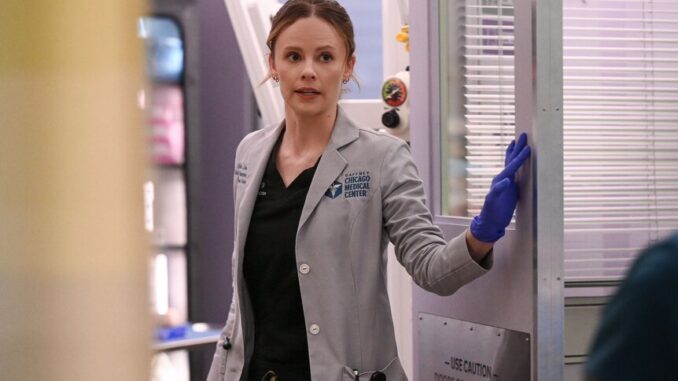
Season 11 of Chicago Med has flipped the script on Dr. Caitlin Lenox (Sarah Ramos) as she lands on the other side of the exam table with a troubling diagnosis. Even Gaffney’s toughest warriors have medical scares, but Lenox is in seriously hot water.
Lenox arrived at Gaffney in Season 10 as a confident, no-nonsense E.D. Chief, but lurking beneath that professional poise was a tragic family history. As a child, Lenox’s mother died just months after being diagnosed with a rare prion disease, Gerstmann-Sträussler-Scheinker (GSS). After her father died by suicide the following day, Lenox was left not only to raise her younger brother on her own, but with the sickening realization that GSS is genetic — she and her brother could die the same way her mother did someday.
While Lenox and her brother had initially vowed never to get tested, that all changed after his health took a turn and Lenox insisted on prion tests. Lenox was relieved to learn her brother tested negative for the prion gene, but her results proved to be her worst nightmare: Lenox tested positive.
Lenox lied about receiving negative results to her brother and colleagues, tearfully processing the potentially life-ending diagnosis in silence. But Lenox can’t run from her diagnosis forever, as proven in Med’s Season 11 premiere (“All Falls Down”) when she was forced to confront her harrowing odds.
What is GSS?

According to John Hopkins, prion diseases comprise several conditions, with many diagnoses under the same umbrella. Prion diseases are rare, with only about 300 cases reported annually in the U.S. Unfortunately there is no cure for prion diseases, but certain medicines can slow down the progression of symptoms.
GSS is one of the rarest prion diseases. According to the National Organization of Rare Disorders, “Gerstmann-Sträussler-Scheinker (GSS) disease is a rare genetic degenerative brain disorder. The symptoms, the progression of the disorder, and the overall severity can vary greatly among affected families and individuals. This is true even among members of the same family.”
Common symptoms of GSS include “a progressive loss of coordination that may present as unsteadiness of gait, difficulty walking, and clumsiness. As the disease progresses, other symptoms become apparent, including dementia, in which there are worsening problems with thought, cognition, memory, language, and behavior. In all instances, GSS is caused by an abnormal variant of the prion protein (PRPN) gene” (per the NORD).
Dr. Sam Abrams offered Dr. Caitlin Lenox help, but she ignored him
After choosing to hide her diagnosis from her Gaffney colleagues, viewers soon learned there was one person she couldn’t bamboozle: Dr. Sam Abrams (Brennan Brown), Gaffney’s Chief of Neurology, who ran the prion test for Lenox and her brother. But Lenox wasn’t finding comfort in Abrams, as proven in Med‘s Season 11 premiere when he confronted Lenox as she enjoyed her break on the Gaffney rooftop.
“You never made a follow-up appointment,” Abrams said, carefully breaching the topic.
“Didn’t see the point,” a depressed Lenox said.
“Look, I understand that you don’t want the world to know about your prion diagnosis,” Abrams said. “But that doesn’t mean you can blow off your follow-up appointments.”
“Why, did they find a cure?” Lenox retorted.
“It’s a mistake not to deal with this,” Abrams leveled with her, only for Lenox to quip that her main mistake was getting tested at Gaffney, where people could pester her about the diagnosis. A steadfast Abrams pulled out a business card and handed it to a confused Lenox.
“An unaffiliated psychiatrist,” Abrams explained. “She’s a relative of mine, specializes in hard cases like yours.”
Upon noticing Lenox’s disinterest, Abrams added that Lenox was in the denial stage of grief, but she clarified: “Actually, I’ve moved on to anger, and I’m loving it.”
Abrams told Lenox that she needed an outlet, but Lenox shrugged that work was her outlet. But that was easier said than done.
Dr. Caitlin Lenox struggled to set aside her diagnosis at Gaffney
Despite the Gaffney mayhem being Lenox’s primary outlet for her anger, she seemed to crack at the seams while treating two injured sisters, one of whom had a bleak survival rate for a required surgery. While Abrams attempted to soften the blow to the girls, Lenox was cold as she explained there was a 50/50 chance of survival.
The famously grumpy Abrams then pulled Lenox to the side to check her on her attitude. Abrams explained that she was deflating hope by being so emotionally brutal, but Lenox struggled to set aside her own bleak biases.
While chatting with the patients later, Lenox clarified where the hostility was coming from. Lenox confessed her terminal diagnosis to them and explained that hope can be dangerous, encouraging them to say their goodbyes in case their time ran out.
Despite her negative thoughts on hope, Lenox refused to give up during a harrowing surgery, miraculously managing to save both of the sisters against all odds. Lenox was happy to reunite the sisters after they woke up, but remained melancholic due to her ongoing health crisis.
